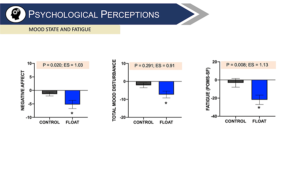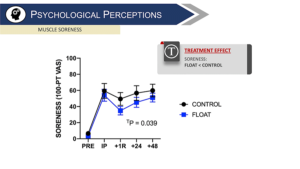Sports enthusiasts often associate an athlete’s success with physical prowess, mental fortitude, and strategic gameplay. However, behind the scenes, their achievements are founded on less glamorous aspects such as consistent practice, conditioning, dietary discipline, and recovery. Expanding on our previous article from last month about Dr. Matt Driller’s work exploration of floating in sports, let’s delve into the research conducted by Dr. Lydia Caldwell, formerly from Ohio State University (now at University of North Texas).
Float tanks have gained popularity among both professional athletes and casual fitness enthusiasts as a dual-purpose tool for mental and physical recuperation. Dr. Caldwell’s extensive involvement with float tanks, as evidenced by her presentations at the 2017 and 2021 Float Conferences, involved collaborations with special forces military and elite athletes, integrating float tanks into her research and performance enhancement protocols.
At the 2017 Float Conference, Dr. Caldwell presented her initial findings on the impact of float tanks on performance, emphasizing increased recovery, reduced fatigue, and enhanced mood. Starting her work with the University of Ohio, she returned in 2021 to present the outcomes of their float tank installations.
Dr. Caldwell’s initial study at the University of Ohio involved 14 trained individuals who had never experienced floating before. Each participant engaged in a 60-minute floatation session, with pre- and post-session assessments of mood and stress hormone levels. Results showed a significant reduction in stress hormones—cortisol, epinephrine, and norepinephrine—post-floatation. Participants also reported improved moods, including reduced tension and negativity.
![]()
This reduction in stress, both physically and mentally, along with additional positive effects, suggests the efficacy of floatation without apparent negative implications. Dr. Caldwell’s findings stressed the importance of acclimatizing to the experience, with participants requiring 10-15 minutes to fully relax and derive benefits from the float tank, overcoming initial discomfort and apprehension.
In her subsequent study, Dr. Caldwell focused on recovery after an intense resistance training workout. Bringing in 12 experienced weightlifters, she examined how floating influenced their recovery from a strenuous lower body workout. All participants underwent two float sessions before the study to ensure familiarity and mitigate anxiety associated with a new environment.
After an intense squat session followed by either floating or watching calming nature videos, participants underwent a series of tests at 24 and 48 hours, including controlled food intake and both recovery conditions. The results shed light on the benefits of floatation therapy in mitigating physical strain and facilitating recovery:
- The float group reported significantly less muscle soreness at 1, 24, and 48 hours after exercise compared to the control.
- Floating also improved mood, fatigue, and pain sensations during the 48 hour recovery period.
- However, floating did not seem to have any effect on metabolic recovery – both groups recovered blood lactate levels within the hour.
- There was also no difference in muscle damage markers like creatine kinase levels or changes in muscle performance between the float and control groups.


Although floatation did not expedite actual muscle repair, participants subjectively felt better during their recovery from the arduous workout. This enhancement likely stemmed from the profound relaxation and pain relief induced by the floatation experience.
Dr. Caldwell’s findings suggest that float tanks could serve as a chronic recovery tool throughout a training season rather than merely before competitions. However, further research is required to determine the optimal timing and frequency of floating for exercise recovery.
Highlighting the significance of mental health in sports performance, Dr. Caldwell emphasizes that if float tanks aid athletes in feeling rejuvenated and better equipped to handle rigorous training, they are a valuable recovery modality.
This applies not only to professional athletes but to all individuals. While performance remains a primary goal, it’s the unnoticed efforts on the sidelines that pave the way for spectacular highlights and victories. Float tanks serve not only as a physical recovery tool but as a practice that fosters good moods, cultivates a resilient mindset, and enhances the likelihood of achieving personal goals.



Recent Comments